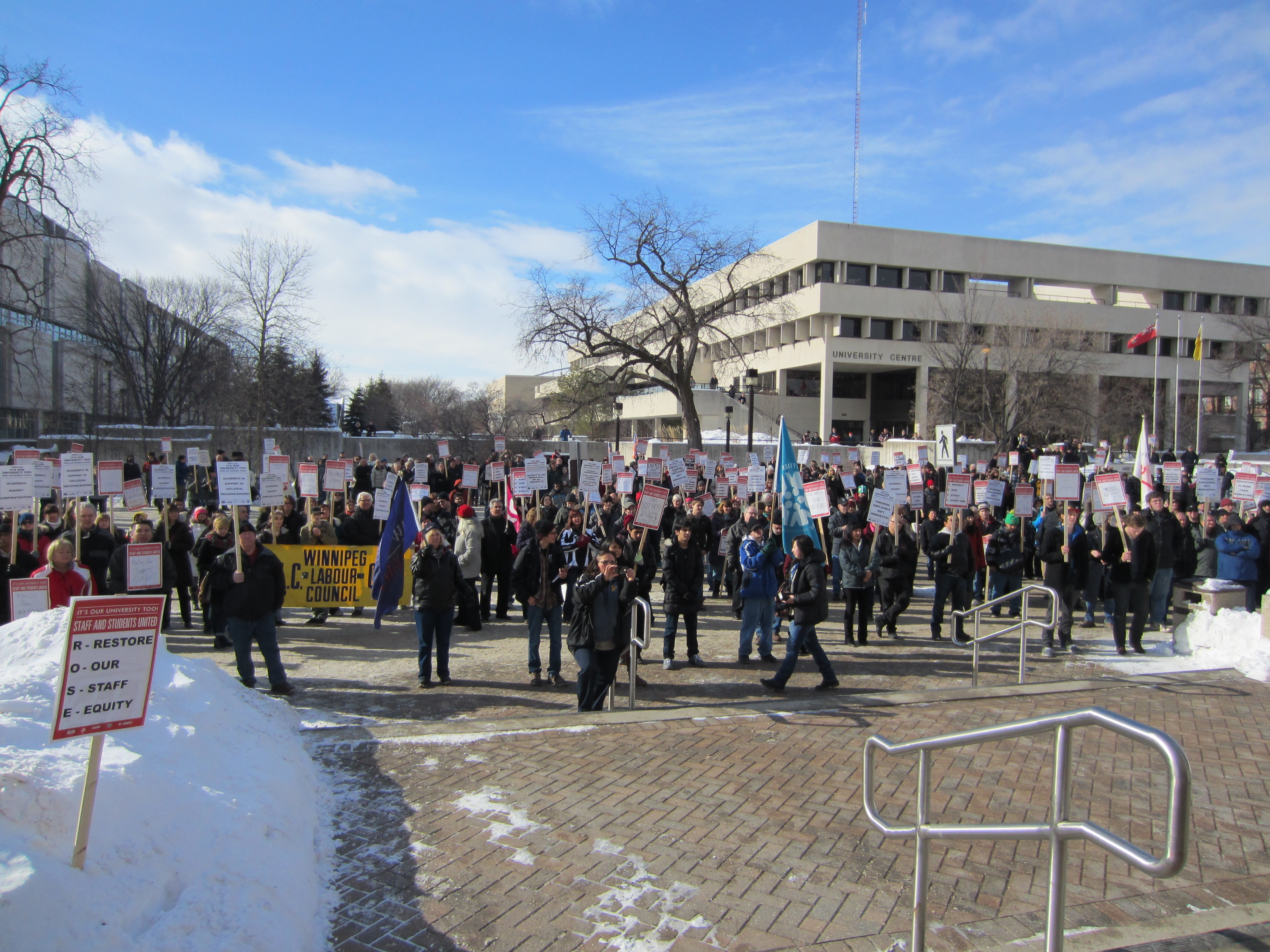Governance
The UMFA constitution provides that the Regular Membership of the Association, duly assemble in a properly called general meeting of the Association, is the highest authority for deciding the policies and managing the affairs of UMFA. The Regular Membership, assembled in a meeting, decides on the general priorities for contract negotiations and on the Association’s budget and organizational priorities.
The Board of Representatives is elected from and by membership constituencies to manage the affairs of UMFA, subject to the direction or approval of general meetings of the Association. The Board adopts policy, appoints committees and the Executive Council (except for the President and Vice-President who are elected by the membership), considers recommendations to general meetings, and oversees the work of the Executive Council.
The Executive Council comprises the President, Vice-President, Past President, Secretary, Treasurer, Grievance Officer, and Contract Administrator, together with other members appointed by the Board of Representatives. The Executive Council manages the affairs of UMFA between meetings of the Board, provides recommendations to the Board and membership on issues before the Association, and implements the Board’s resolutions. The Executive Council is also charged with determining whether UMFA will proceed to arbitration in grievances.
Who We Are
The University of Manitoba Faculty Association (UMFA) is the certified bargaining agent for approximately 1200 full-time academic staff at the University of Manitoba. Relations between the Association and the university administration are governed by a Collective Agreement.
UMFA advocates for Members’ rights and the continual improvement of their working conditions at the university. Prospective Members are encouraged to review the material relevant to them on the website and also to contact the Association for further information and assistance.
UMFA belongs to the Canadian Association of University Teachers (CAUT) and to the National Union of CAUT (NUCAUT), through which we maintain membership in the Canadian Labour Congress (CLC) and the Manitoba Federation of Labour (MFL). We are also a member of the Manitoba Organization of Faculty Associations (MOFA).
Please contact us if you have any questions about UMFA or about any of the website content.
About UMFA
The UMFA Constitution establishes the Objectives of the Association as:
- To promote the interests of teachers, researchers, and librarians at the University of Manitoba, to advance the standards of their professions, and to improve the quality of higher education in Canada.
- To bargain collectively on behalf of members of the Bargaining Unit as defined by the Manitoba Labour Board.
- To represent all members of the Bargaining Unit in employer-employee relationships with respect to such matters as salaries, pension, working conditions, leaves, promotions, job security, and grievance.
Association Objectives and History
Association Objectives
To promote the interests of teachers, researchers, and librarians at the University of Manitoba, to advance the standards of their professions, and to improve the quality of higher education in Canada.
To bargain collectively on behalf of members of the Bargaining Unit as defined by the Manitoba Labour Board.
To represent all members of the Bargaining Unit in employer-employee relationships with respect to such matters as salaries, pension, working conditions, leaves, promotions, job security, and grievance.
Association History
A faculty association has been in existence at the University of Manitoba since 1951. The founding organization was named the Association of Academic Staff of the University of Manitoba and at the time of its establishment had a membership of 169. In June of 1971, this Association changed its name to the University of Manitoba Faculty Association (UMFA). UMFA was formally certified by the Manitoba Labour Board as the bargaining agent for full-time academic staff at the University of Manitoba in November of 1974. UMFA membership totals approximately 1,200 professors, instructors, and academic librarians.
UMFA Banner

The UMFA banner, pictured here, hangs on the east wall of the UMFA boardroom. Carole Condé and Karl Beveridge, two artists with a long history of designing images for labour organizations, were commissioned by UMFA to produce the work. We are proud to have this remarkable piece of art which commemorates our history and symbolizes the work of our Members.
Activities

Collective Bargaining: UMFA represents its members in negotiating collective agreements. The Association membership approves the priorities for bargaining. The Board of Representatives determines the progress of bargaining within these priorities, and the Executive Council directs the bargaining team within the parameters defined by the membership and the Board of Representatives.
Employee-Employer Relations: UMFA represents individuals with respect to their employment and the provisions of the Collective Agreement. Where disputes arise, UMFA representatives attempt, either informally or through the grievance and arbitration procedures, to achieve satisfactory resolutions.
Higher Education Issues: UMFA is active in these issues in the public forum, in relations with government, and in its work with its affiliates. The UMFA President is the official spokesperson to the media on all matters. The Association has participated fully in committee hearings considering new legislation affecting the interests of academics and post-secondary education.
Memberships
Regular Members
All full-time members of the academic staff and all full-time librarians as described by the Labour Board certificate are members of the bargaining unit. They are covered by the terms of the Collective Agreement and required to pay dues to UMFA. Members of the bargaining unit can choose to join UMFA by signing a membership card. There is no additional cost in doing so. Membership in UMFA affords members the ability to participate in the governance of the Association, to elect colleagues to office or to be elected, to serve on committees, and to vote on proposals for collective bargaining. The vast majority of members of the bargaining unit are members of UMFA.
Associate Members
All full-time members of the academic staff and all full-time professional librarians who are excluded from the bargaining unit are eligible to become Associate Members. Associate Members can participate in decision-making in matters not related to collective bargaining through their representatives on the Board of Representatives. Associate Members of UMFA are also Associate Members of the Canadian Association of University Teachers.
Retired Members
All former members of UMFA who have retired are eligible to become Retired Members and participate in the decision-making in matters not related to collective bargaining through their representatives on the Board of Representatives. The fee for Retired Membership in UMFA is nominal. Retirees may also apply for retired membership in CAUT.
Affiliations
Canadian Association of University Teachers (CAUT): UMFA is an organizational member and each member of UMFA is an affiliated member of CAUT. CAUT is a national body whose objects are to promote the interests of academic staff (including professors, professional librarians, and researchers), to advance the standards of their professions, and to seek to improve the quality of higher education in Canada. UMFA participates in activities of CAUT on national matters such as research funding, the federal role in post-secondary education, and copyright legislation.
National Union of CAUT (NUCAUT): Through its membership in NUCAUT, UMFA is affiliated with the Canadian Labour Congress (CLC). Membership in the CLC provides opportunities to promote and defend public education and become more informed, active, and effective in advocating for human and civil rights, academic freedom, and freedom of speech. UMFA also has access to CLC conferences and training seminars.
Manitoba Federation of Labour (MFL): Membership in the MFL allows UMFA to call on unions and labour organizations for advice and support during times of job action. It provides a venue for the Association to inform other workers of the issues facing our Members at the bargaining table and in the workplace. The MFL is an important ally in lobbying the provincial government (e.g., on post-secondary education issues) and in advocating for legislative amendments (e.g., changes to the Workplace Health and Safety Act).
Winnipeg Labour Council (WLC): The WLC promotes the goals of the labour movement in Winnipeg. Directly chartered by the CLC and affiliated to the MFL, the WLC provides a voice on municipal, provincial and national issues, and promotes the social and economic welfare of workers and of Canada. UMFA's membership allows it to participate in discussions with other union locals regarding issues within the community and to provide as well as receive advice and support with respect to other unions and labour organizations.
Manitoba Organization of Faculty Associations (MOFA): The provincial organization of faculty associations provides a co-ordinated voice for academic staff at the universities of Manitoba, Winnipeg, Brandon, and St-Boniface. Among other issues, MOFA has taken on the challenges of raising the profile of higher education issues during provincial elections.
